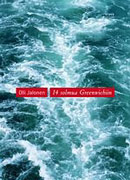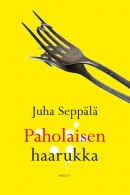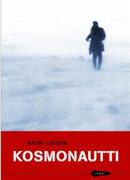Tag: Finlandia Prize
Sofi Oksanen wins the 2008 Finlandia Prize
10 February 2009 | In the news

Sofi Oksanen. - Photo: Toni Härkönen/WSOY.
The Finlandia Prize for Fiction, Finland’s most prestigious literary prize, was awarded to Sofi Oksanen’s novel Puhdistus (‘Purge’, WSOY, 2008). ‘When the concentrated focus of drama and the multidimensionality of narrative conjoin, Puhdistus is born – a muscular, harsh, and solid book’, said the writer and critic Pekka Tarkka awarding the prize on 4 December. (For a short review, see the Review section.)
The prize, worth € 30,000, was awarded for the twenty-fifth time. The final choice was made from the shortlist of six candidates; the others were 14 solmua Greenwichiin (‘14 knots to Greenwich’, Otava) by Olli Jalonen, Kosmonautti (‘The cosmonaut’, Tammi) by Katri Lipson, Marie (Otava) by Arne Nevanlinna, Kohtuuttomuus (‘Excess’, Siltala) by Pirkko Saisio and Paholaisen haarukka (‘The Devil’s fork’, WSOY) by Juha Seppälä. More…
Sofi Oksanen: Puhdistus [Purge]
5 February 2009 | Mini reviews
![Sofi Oksanen: Puhdistus Sofi Oksanen: Puhdistus [Purge]](https://booksfromfinland.fi/wp-content/uploads/2009/02/puhdistusweb-130x164.jpg) Puhdistus
Puhdistus
[Purge]
Helsinki: WSOY, 2008. 380 p.
ISBN 978-951-0-33973-2
€ 29.90, paperback
Sofi Oksanen’s first play Puhdistus (‘Purge’) was staged at Finland’s National Theatre in 2007. Oksanen (born 1977) has an Estonian-Finnish background and studied at the Theatre Academy. Puhdistus, her third novel, retells the story of her play about two women and moves through the past by flashbacks between 1939 and 1992. Aliide has experienced the horrors of the Stalin era and the deportation of Estonians to Siberia, but she herself has to cope with the guilt of opportunism and even manslaughter. More…
Olli Jalonen: 14 solmua Greenwichiin [14 knots to Greenwich]
30 December 2008 | Mini reviews
 14 solmua Greenwichiin
14 solmua Greenwichiin
[14 knots to Greenwich]
Helsinki: Otava, 2008. 381 p.
ISBN 978-951-1-23014-4
€ 34.40, hardback
The ‘knots’ in the title refer to the 14-part control device in a competitive expedition that the participants have to use to check in at the control points. The Finn Petr Järvi leaves London together with his scientist friend Graham and Graham’s wife Isla on a year-long contest, held in honour of the 350th anniversary of the scientist Edmund Halley. More…
Juha Seppälä: Paholaisen haarukka [The Devil’s fork]
30 December 2008 | Mini reviews
 Paholaisen haarukka
Paholaisen haarukka
[The Devil’s fork]
Helsinki: WSOY, 2008. 267 p.
ISBN 978-951-0-34534-4
€ 32, hardback
Seldom does a novel manage to be as topical as Juha Seppälä’s latest – his tenth – which portrays a great economic crisis and the people who are dragged along with it. Seppälä has written lines for his characters where they claim that a novel is only able to depict a reality that existed years ago – but Paholaisen haarukka proves this is not true. More…
Katri Lipson: Kosmonautti [The cosmonaut]
30 December 2008 | Mini reviews
 Kosmonautti
Kosmonautti
[The cosmonaut]
Helsinki: Tammi, 2008. 199 p.
ISBN 978-9513-142940
€ 22.50, hardback
Kosmonautti is a reflective first novel by a mature author; Lipson (born 1965), a medical doctor, has succeeded in weeding out the non-essential. In a cold, dark Murmansk during the final decade of the Soviet Union, three people live out their dreams. Seryozha is the good boy who adores space travel and his beautiful music teacher, Svetlana Kovalevna. She is harassed both in the classroom and in the staffroom, and by her snooping neighbours in the communal apartment. More…
Literary prizes
15 November 2008 | In the news
In November six novels were shortlisted for the twenty-fifth Finlandia Prize for Fiction, to be awarded on 4 December.
The miracle of the rose
Issue 2/1997 | Archives online, Fiction, Prose
Extracts from the novel Naurava neitsyt (‘The laughing virgin’, WSOY, 1996). The narrator in this first novel by Irja Rane is an elderly headmaster and clergyman in 1930s Germany. In his letters to his son, Mr Klein contemplates the present state of the world, hardly recovered from the previous war, his own incapacity for true intimacy – and tells his son the story of the laughing virgin, a legend he saw come alive. Naurava neitsyt won the Finlandia Prize for Fiction in 1996
28 August
My dear boy,
I received your letter yesterday at dinner. Let me just say that I was delighted to see it! For as I went to table I was not in the conciliatory frame of mind that is suitable in sitting down to enjoy the gifts of God. I was still fretting when Mademoiselle put her head through the serving hatch and said:
‘There is a letter for you, sir.’
‘Have I not said that I must not be disturbed,’ I growled. I was surprised myself at the abruptness of my voice.
‘By your leave, it is from Berlin,’ said Mademoiselle. ‘Perhaps it is from the young gentleman.’
‘Bring it here,’ I said. More…
